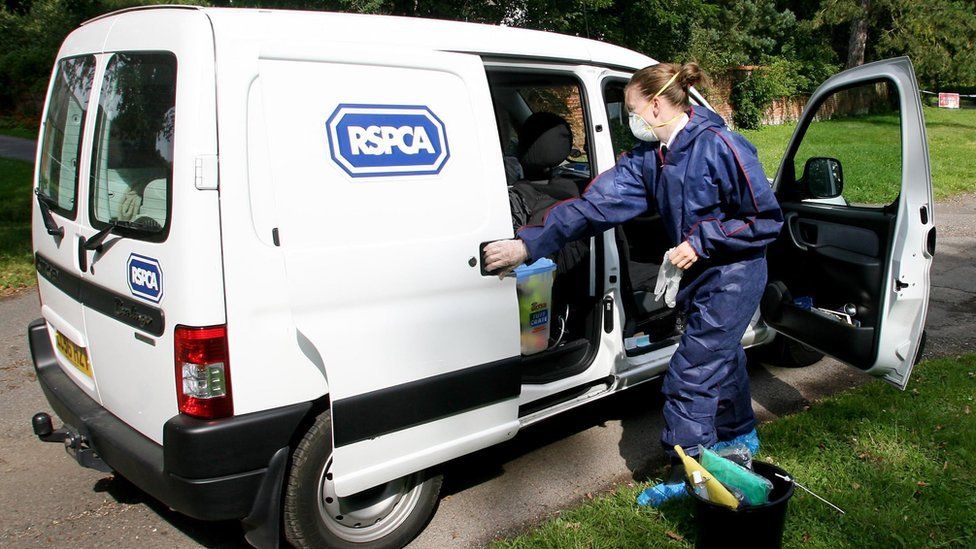MPs reject attempt to revive animal welfare bill
- Published
- comments

MPs have rejected an attempt by Labour to force the government to revive its flagship animal welfare bill.
In May, the government quietly dropped its Kept Animals Bill which aimed to crack down on dog thefts and ban the live exports of farm animals.
The government is still pursuing plans to ban keeping primates as pets - a 2019 Tory manifesto pledge and a central tenet of the previous bill.
But campaigners accuse the government of betraying its animal welfare agenda.
In a joint statement, 18 animal protection organisations, including the RSPCA, Humane Society International/UK and Dogs Trust, urged MPs to reintroduce the bill describing it as "the obvious and most expedient vehicle to create protections for farmed, companion and wild animals".
"Animals are sentient individuals, with needs and emotions, vulnerable to mistreatment. They are not political footballs," the statement added.
Labour's motion in the Commons aimed to force the bill back into Parliament, in defiance of the government's plans.
If passed, the motion would have allocated 12 July to try to pass the bill through its final legislative steps in the House of Commons.
However, following a debate, MPs voted by 256 votes to 183 to reject Labour's motion.
A number of Conservatives have previously expressed frustration at the government's decision to pull the bill, but during the debate some attacked Labour for tabling the motion.
Tory Dame Andrea Jenkyns said that, by attempting to reintroduce the bill rather than simply a motion to support it, the opposition party had been "too clever by half"
She said she had been prepared to vote with the opposition on the issue, but couldn't "let an unelected opposition take control" of Parliament's timetable.
'Weak husk'
Sir Iain Duncan Smith said: "If the opposition has genuinely wanted to make this and put pressure on the government to do this, a simple motion that said we would support the bill moving and being adopted would have got everybody in favour of it. By doing this in a way that tries to take over the business he knows very well that this is actually about the politics."
Labour's shadow environment minister Alex Sobel said Conservative MPs had supported the bill, "so why can they not today join us and give us the time to get this through".
"Let's work together to do the right thing and put animal welfare before party politics," he said.
The SNP's Patricia Gibson described the government as a "weak, lily-livered husk" which "doesn't even have the confidence to deliver its own manifesto commitment". She added that Scotland was "shackled to a corpse that can not act".
Environment minister Trudy Harrison sought to reassure MPs that the government was committed to introducing the animal welfare measures "successfully and swiftly" through different bills.
Announcing in May that the bill had been scrapped, environment minister Mark Spencer put the blame mostly on Labour, saying the opposition were "clearly determined to play political games by widening the scope of this bill".
Mr Spencer said at the time that the government would use single-issue legislation to keep to commitments on "cracking down on puppy smuggling", "ban live exports for fattening and slaughter", and tackle pet abduction and livestock worrying.
Livestock worrying is when a dog attacks or chases livestock on agricultural land, which can result in injury or death.
On Tuesday, the government announced plans to consult on a new system of licences to effectively ban the keeping of primates as pets.
The new licensing system, based on the results of a consultation held in December 2020, requires "zoo-level standards" of care for any primate kept in captivity in the UK.
Up to 5,000 primates - mammals which include apes, monkeys and lemurs - are living outside licensed zoos in the UK, according to RSPCA estimates.
A Department for Environment, Food and Rural Affairs spokesperson said: "The UK is a world leader on animal welfare and we are fully committed to maintaining and enhancing our strong track record to date.
"We are committed to delivering the Kept Animals Bill measures individually during the remainder of this Parliament and look forward to progressing these. We will be setting out next steps in due course."
Related Topics
- Published12 December 2020